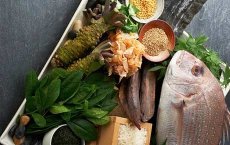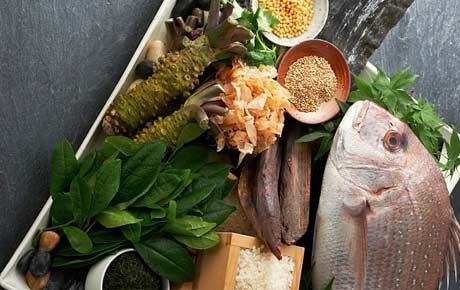Medical expert of the article
New publications
Diet for elevated bilirubin
Last reviewed: 04.07.2025

All iLive content is medically reviewed or fact checked to ensure as much factual accuracy as possible.
We have strict sourcing guidelines and only link to reputable media sites, academic research institutions and, whenever possible, medically peer reviewed studies. Note that the numbers in parentheses ([1], [2], etc.) are clickable links to these studies.
If you feel that any of our content is inaccurate, out-of-date, or otherwise questionable, please select it and press Ctrl + Enter.

A diet for elevated bilirubin is an opportunity to restore health without resorting to serious drug therapy. We will tell you about the rules of nutrition, about healthy and prohibited products, and also create an approximate diet.
A diet for elevated bilirubin is not a panacea, but it is a safe way to lower bilirubin, improve well-being and blood composition. Bilirubin is a special substance that is formed from hemoglobin during the breakdown of red blood cells contained in liver cells. In other words, bilirubin is a bile pigment.

A bilirubin level exceeding 17.1 μmol/l is considered pathological. With such tests, a person feels unwell, headaches, nausea, fatigue, the skin begins to turn yellow and itching appears. Increased bilirubin levels indicate liver disease. Therefore, the first thing to do in order to lower the bilirubin level is to unload the liver.
Diet for high bilirubin
Diet for elevated bilirubin is aimed at normalizing the liver enzyme. People with high bilirubin are prohibited from consuming salt, and it is also recommended to reduce the consumption of bread and butter. Any spices and seasonings should be salt-free. It is prohibited to consume products that contain soda or baking powder (cakes, pastries, biscuits and other baked goods).
Salted and canned vegetables and salads must be excluded from the diet forever. Smoked delicacies such as sausage, fish, balyk, bacon, and seafood are also prohibited. It is not allowed to eat sweets, ketchup, mayonnaise, and mustard. Of the vegetables, it is forbidden to eat mushrooms, sorrel, green onions, spinach, and radishes. Alcohol is also prohibited by the rules of nutrition for high bilirubin. As for fruits, you will have to give up lemons, oranges, cherries, and any other fruits that contain acid. Particular attention should be paid to foods with fiber. You need to eat often and in small portions so that the body has time to process the food.
Sample menu for elevated bilirubin
A sample menu for elevated bilirubin will help restore normal liver function and bring the body to a normal state. We offer you a sample menu that can be used throughout the entire period of high bilirubin levels, until it is normalized.
Breakfast
- Boiled rice.
- A couple of spoons of low-fat sour cream and a banana.
Snack
- One sweet apple or persimmon.
- A glass of juice or green tea.
Dinner
- Buckwheat soup or buckwheat porridge with boiled chicken (without skin and fat).
- Steamed carrot pancakes.
- A glass of yogurt or a handful of cottage cheese.
Snack
- Cottage cheese casserole.
- Vegetable salad (carrots, beets), dressed with olive oil.
Dinner
- Baked fish, some homemade noodles and boiled cauliflower.
- Cottage cheese with banana or a glass of yogurt.
You can create your own diet, but only within the recommended products. Following this diet for a month, you will normalize bilirubin levels and cleanse your intestines.
Diet for high bilirubin is a painless and safe method to reduce bile production and normalize liver function. Regular adherence to strict but effective dietary rules is a great way to be healthy.
What foods can you eat if you have elevated bilirubin?
Let's look at what foods can be eaten with elevated bilirubin. Knowing the list of permitted foods, you can create a diet that will help lower bilirubin in the blood. So, the basis of the diet should be:
- Vegetables and vegetable dishes.
- Porridge (without salt and oil).
- Lean meat and fish.
- Low-calorie kefir, sour cream, cottage cheese.
- Vegetable and olive oil.
- Sweet varieties of fruits.
Particular attention should be paid to the drinking regime. You need to drink from 1.5 to 2 liters of clean water per day. This will help speed up the metabolism process.
What foods should not be eaten if you have elevated bilirubin?
With any disease, there are a number of prohibited products. We suggest you consider which products should not be eaten with elevated bilirubin. Please note that only those products are prohibited, the consumption of which really affects the functioning of the liver and bilirubin levels. With high bilirubin levels, you will have to give up the following products:
- Salt, seasonings and spices with salt.
- Alcohol.
- Sour fruits and berries.
- Baking with baking powder and soda.
- Smoked delicacies (sausages, fish, seafood).
- Sugar, any kind of cheese.
- Any canned goods (vegetables, salads, assorted).
Many products are prohibited. But following the rules of nutrition and diet with elevated bilirubin will help to bring the body back to order, normalize liver function and bilirubin production in the future.


 [
[